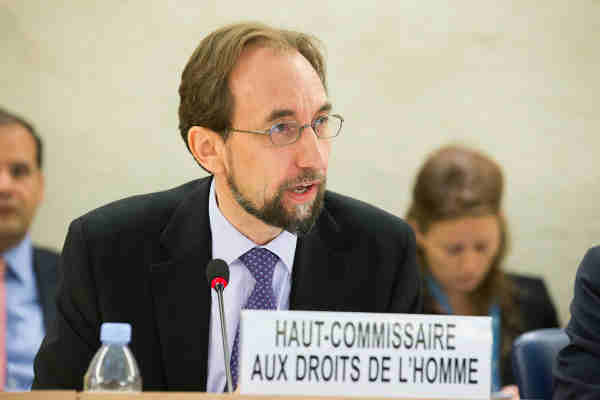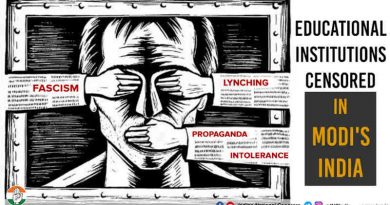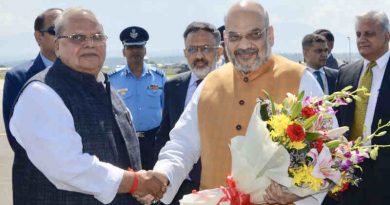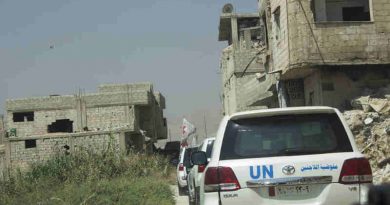UN Human Rights Office Denied Access to Kashmir

UN Human Rights Office Denied Access to Kashmir
Kashmir has been facing a series of violent incidents since the killing of a 22-year-old rebel leader Burhan Wani by the Indian security forces on July 8 in an encounter which many believe was avoidable.
By Rakesh Raman
Last month, Nobel laureate Amartya Sen said in an interview with a local TV channel that “the recent unrest in Kashmir has been grossly mishandled by the Indian government to the extent that the region reflects as the biggest blot on Indian democracy.”
In just a month of his statement, the situation in Kashmir has worsened to reach a stage of panic. Reports suggest that more than 80 people have already been killed and thousands got injured in the violence that took place during the past 50 days in the troubled valley.
Although the United Nations (UN) was silent on Kashmir in the past, but now the state-sponsored human rights violations in Kashmir have reached such an alarming peak that the UN has offered to mediate.
Of late, the UN Secretary-General Ban Ki-moon deplored the killings in Kashmir and offered to provide his mediation to facilitate a dialogue between India and Pakistan. Both the warring countries did not accept his proposal.
A few days ago, the UN High Commissioner for Human Rights Zeid Ra’ad Al Hussein expressed deep regret at the failure of Indian and Pakistani authorities to grant the UN Human Rights Office access to Indian-administered Jammu and Kashmir (J&K) and Pakistan-administered Kashmir respectively, given grave concerns about the recent allegations of serious human rights violations.
Zeid had urged India and Pakistan to grant independent observers access to Kashmir. Since the latest outbreak of violence in early July, Zeid has been engaging with both Indian and Pakistani authorities to seek access to the troubled region but the UN human rights team has not been allowed to enter Kashmir.
Trouble in Kashmir
Kashmir has been facing a series of violent incidents since the killing of a 22-year-old rebel leader Burhan Wani by the Indian security forces on July 8 in an encounter which many believe was avoidable.
Nearly 80 people have died and thousands injured in the conflicts between the supporters of Burhan Wani and the Indian security forces in Kashmir, which is a disputed territory between India, Pakistan, and China.
Although Burhan Wani was branded as a terrorist by the Indian rulers, he was a freedom fighter for the tens of thousands of local Kashmiris. They rallied behind Burhan Wani to face the excesses of security forces who have been given a free hand by the Indian government to deal with all those in Kashmir who demand freedom.
Many prominent Indians have also said in the past that the people of Kashmir should be allowed to decide about their fate. A political activist Prashant Bhushan, for example, had called for a plebiscite in Kashmir and said that Kashmir should be allowed to break away from the country if Kashmiris did not want to stay as part of India.
The Guardian reported that the Booker prize-winning novelist and human rights campaigner in India Arundhati Roy was facing the threat of arrest after claiming that the disputed territory of Kashmir was not an integral part of India.
In order to support the freedom struggle of the people of Kashmir, voices were also heard a few months ago at the Jawaharlal Nehru University (JNU) in India’s capital New Delhi. But the Indian government used its law and order machinery to successfully crush the students’ protests led by Kanhaiya Kumar, a student leader.
The students had to finally approach the government-run National Human Rights Commission (NHRC) to seek protection from the government’s security forces.
Now, the Indian arm of human rights organization Amnesty International is facing sedition charges in India for its repeated efforts to raise the issue of state atrocities in the disputed territory of Kashmir.
Amnesty India reports that a police complaint has been filed against it for an event that allowed families of the victims of human rights violations in Jammu and Kashmir to tell their stories.
The event was held on August 13 in Bengaluru (Bangalore) while the complaint, according to Amnesty, was filed two days later by a representative of Akhil Bharatiya Vidyarthi Parishad (ABVP), the student wing of the ruling Hindu group Bharatiya Janata Party (BJP).
It is alleged in the complaint that anti-India slogans were raised in the event that resulted in inciting a sentiment against the Indian state – which amounts to sedition.
The successive governments in India have tried to suppress all voices that demand even a peaceful settlement to the Kashmir conflict. They use sedition law in a freewheeling manner to intimidate the peacemakers.
Human Rights Abuses
Kashmir has always been a conflict area between India and Pakistan since 1947 when both these countries got freedom from the British rule. In order to stake their claims over Kashmir, India and Pakistan have fought two bloody wars in 1965 and 1971, besides incessant skirmishes between the rival armies.
Repeated reports from international agencies suggest that human rights abuses in the Indian-administered Jammu and Kashmir (J&K) state are happening constantly. The abuses range from mass killings, enforced disappearances, torture, rape and sexual abuse to political repression and suppression of freedom of speech.
It is estimated that more than 50,000 people (most of them were civilians) have been killed in the Kashmir insurgency. International human rights organization Human Rights Watch has stated in its report that Indian security forces “assaulted civilians during search operations, tortured and summarily executed detainees in custody and murdered civilians in reprisal attacks.”
Another human rights organization Amnesty International said recently that the authorities in Jammu and Kashmir must stop using pellet-firing shotguns on protesters. It stated that the use of pellet-firing shotguns is not in line with international standards on the use of force.
“I deeply regret that our requests for access have not been granted. Given the seriousness of the allegations of the use of excessive force, allegations of state sponsorship of violence, as well as the number of people killed and the very large number of people injured, the continuing unrest and the almost daily reports of violence in the region, it is unfortunate that our sincere attempts to independently assess the facts in relation to reports of human rights violations have failed,” the UN High Commissioner for Human Rights Zeid Ra’ad Al Hussein said.
“We requested full and unhindered access to the affected population, to interview a variety of individuals on the ground, including victims, witnesses, security forces, and with access to relevant documentation. Such access would enable us to provide an independent and fact-based analysis of the situation, which is so crucial in volatile, politically charged situations. Without access, we can only fear the worst,” Zeid added.
“I reiterate our request for access,” he said.






